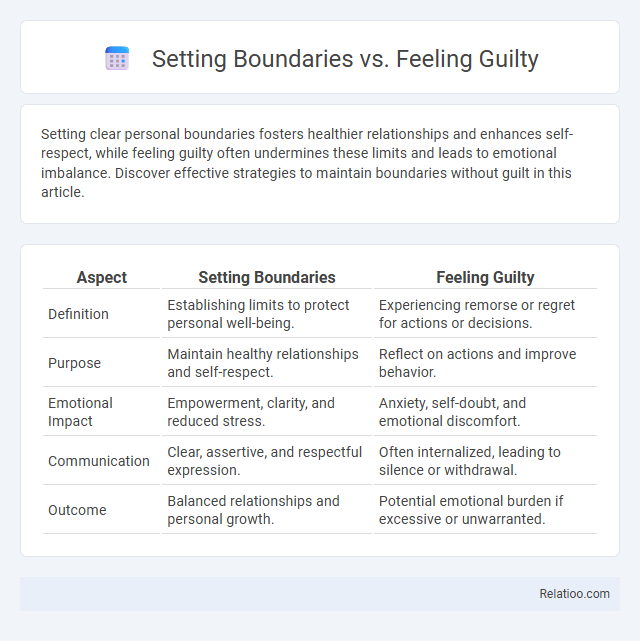Setting clear personal boundaries fosters healthier relationships and enhances self-respect, while feeling guilty often undermines these limits and leads to emotional imbalance. Discover effective strategies to maintain boundaries without guilt in this article.
Table of Comparison
| Aspect | Setting Boundaries | Feeling Guilty |
|---|---|---|
| Definition | Establishing limits to protect personal well-being. | Experiencing remorse or regret for actions or decisions. |
| Purpose | Maintain healthy relationships and self-respect. | Reflect on actions and improve behavior. |
| Emotional Impact | Empowerment, clarity, and reduced stress. | Anxiety, self-doubt, and emotional discomfort. |
| Communication | Clear, assertive, and respectful expression. | Often internalized, leading to silence or withdrawal. |
| Outcome | Balanced relationships and personal growth. | Potential emotional burden if excessive or unwarranted. |
Understanding the Concept of Boundaries
Setting boundaries is essential for maintaining healthy relationships and protecting your emotional well-being, allowing you to clearly define what behavior is acceptable and what is not. Understanding the concept of boundaries helps distinguish between legitimate self-care and unwarranted feelings of guilt that arise when asserting your needs. Recognizing that guilt is often an emotional response rather than a reflection of wrongdoing empowers you to establish limits without compromising your mental health.
Why We Feel Guilty When Setting Limits
Setting boundaries often triggers guilt because our brains associate saying no with potential rejection or disappointing others. This guilt stems from deeply ingrained social conditioning that prioritizes others' needs over our own well-being, leading to internal conflict when enforcing limits. Understanding this psychological mechanism helps individuals recognize that guilt is a natural response, not an indicator of wrongdoing, empowering healthier boundary setting.
The Psychological Benefits of Healthy Boundaries
Setting healthy boundaries enhances your psychological well-being by reducing stress, promoting self-respect, and preventing burnout. Establishing clear limits helps distinguish between guilt rooted in responsibility and unhealthy guilt that hinders personal growth. Prioritizing your mental health through boundaries fosters emotional resilience and improves relationships by encouraging mutual respect.
Common Myths About Boundaries and Guilt
Common myths about setting boundaries include the belief that it causes guilt or damages relationships, but healthy boundaries actually promote mutual respect and personal well-being. Many people confuse guilt, a feeling linked to specific actions, with the discomfort of asserting limits, falsely assuming that setting boundaries is selfish or harmful. Understanding that guilt can be a misguided emotional response helps individuals overcome these myths and establish clear, necessary boundaries without unnecessary self-blame.
How Guilt Manifests When Saying No
Guilt often manifests as an overwhelming emotional response when setting boundaries, especially during the act of saying no. This guilt can trigger self-doubt, anxiety, and an irrational sense of responsibility for others' happiness, which undermines personal autonomy. Understanding these manifestations helps in developing healthier boundary-setting practices without internalizing guilt.
Practical Strategies for Setting Boundaries
Effective boundary-setting involves clearly communicating personal limits to protect emotional well-being while minimizing feelings of guilt. Practical strategies include using assertive language, practicing self-awareness to recognize when boundaries are needed, and reinforcing limits consistently without over-explaining. Understanding that guilt often arises from internalized expectations allows individuals to reframe boundary-setting as a form of self-respect rather than selfishness.
Overcoming the Fear of Disappointing Others
Setting boundaries is essential for maintaining your mental health and personal well-being, even when you fear disappointing others. Overcoming guilt associated with establishing limits requires recognizing that your needs are valid and that you cannot control others' reactions. Embracing self-respect and clear communication empowers you to prioritize your happiness without unnecessary feelings of guilt.
Communicating Boundaries Without Apology
Communicating boundaries without apology empowers individuals to assert personal limits confidently, promoting healthier relationships and self-respect. Expressing needs clearly without guilt reduces emotional burden and prevents resentment, fostering mutual understanding and respect. Consistently maintaining unapologetic boundaries strengthens emotional resilience and supports mental well-being.
Reframing Guilt as Self-Compassion
Setting boundaries is an essential practice for maintaining mental health and personal well-being, yet many struggle with guilt when enforcing limits. Reframing guilt through self-compassion transforms it from a negative emotion into an opportunity for growth and self-care, promoting healthier relationships. Understanding guilt as a signal rather than a punishment allows individuals to honor their needs without self-criticism or shame.
Building Confidence in Boundary-Setting
Building confidence in boundary-setting involves recognizing that your needs and limits are legitimate, not selfish. Setting boundaries protects your well-being and fosters healthier relationships, reducing feelings of guilt often associated with prioritizing yourself. Embracing this mindset helps you shift from guilt to empowerment, making boundary-setting a positive and affirming practice.

Infographic: Setting Boundaries vs Feeling Guilty
 relatioo.com
relatioo.com